Kenya Safaris - Ultimate First Safari Guide
Embark on a once-in-a-lifetime adventure with our comprehensive guide to Kenya safaris for first-timers. Our expert travel guide will help you discover the best wildlife reserves, national parks, and accommodation options in Kenya, while providing valuable tips and tricks from experienced safari-goers. From the stunning landscapes of Maasai Mara to the majestic Mount Kenya, our guide covers everything you need to know to make the most of your safari experience in Kenya.
As the pioneer safari destination and one of the leading African safari destinations, Kenya is renowned for its spectacular wildlife shows, making it a top choice for family vacations. Our guide will help you plan an unforgettable adventure in Kenya, outshining other East African destinations. Whether you’re planning your first or third safari, our travel guide is packed with the best ideas to help you create memories that will last a lifetime.
KENYA SAFARIS TRAVEL GUIDE
Overview
You have made a great decision by selecting Kenya Safaris for your first wildlife adventure in Africa. As the pioneer safari destination and one of the leading African safari destinations, Kenya is renowned for its spectacular wildlife shows, making it a top choice for family vacations and first-time safari experiences in Africa. Our guide is packed with the best ideas to help you create memories that will last a lifetime, outshining other East African destinations.
Kenya is a land of astonishing diversity and extraordinary tourist attractions, perfect for wilderness adventure vacations. Nairobi, the capital, is a bustling city where colonial buildings rub shoulders with modern skyscrapers, while steamy, coastal Mombasa retains its solid Arabic influence and history as Kenya’s largest and busiest port. Kenya lies on Africa’s east coast, bordered by Uganda to the west, Tanzania to the south, South Sudan and Ethiopia to the north, Somalia to the northeast, and the Indian Ocean to the southeast.
When planning your first-time safari in Africa, Kenya is an excellent destination to explore. It’s also a great addition to gorilla trekking in neighboring Uganda or Rwanda. Don’t miss out on the coastal beaches, which are a perfect getaway vacation to end your Kenya safari. Let our expert guide help you plan your unforgettable adventure in Kenya safaris as a first-time safari-goer.
Highlights
- Explore the Great Rift Valley dotted with a string of lakes including Nakuru and Naivasha; fertile highlands with towering peaks such as Mt. Kenya; and a coastline and islands with long pristine sandy beaches and marine parks full of coral reefs and colorful fish. Its two major cities couldn’t be more different.
- The Big Five are all present and seen with various degrees of ease. Elephants, buffaloes, and unusually large lion prides are common. Leopards are more elusive but relatively easy to locate with a local pro guide. Up to three dozen black rhinos still survive. Even outside of the migration season, ungulates are well represented; there’s no better place for close-up views of the eland, the world’s largest antelope. A Kenya safari game drive will likely see giraffe, impala, gazelle, topi, Coke’s hartebeest, reedbuck, Defassa waterbuck, hippo, and warthog.
- Birders will find East Africa’s magnificent savanna birdlife around the Mara triangle, with more than 500 species recorded in and around its borders, including such perennial favorites as Lilac-breasted roller, Superb starling, and Little bee-eater.
- During annual wildebeest migration, wildlife drama eclipses during the multiple river crossings, punctuating the great herds’ three-month tenure in the Masai Mara, from August to October.
The Great Migration
Over two million wildebeat and zebra cross the Mara river sometime between July and August, and they repeat this every year in larger numbers. It’s not just the gnu that would attract you here, but also the healthy number of predators looking for an easy meal. this spectacle is not to be missed, especially if it’s your first safari in Kenya.
Why Kenya Safaris Are Great For Your First Safari
The Great Migration
Millions of plains game move in an endless cycle of birth and death from Tanzania’s Serengeti through Kenya’s Mara Triangle. It’s like a movie sequence when they cross the Mara River with predators and prey locked in a life or death dance, the most extraordinary wilderness spectacle on earth that should take you to Kenya.
Big Game Viewing
Visiting Kenya’s legendary national parks and game reserves almost guarantees that you’ll see the famous Africa safari’s Big Five animal popularised by the colonial white hunters in the early birth of Africa safari. And where there’s big game, there are definitely huge herds of plains animals and hundreds of colorful birds.
Mythical Nomadic Tribes
Maasai communities lie within the Maara bounds and other famous game reserves. The tall and dignified red-robed Maasai have held explorers, adventurers, and writers in thrall for centuries. Cultural adventure excursions in Maasai villages to view men herding livestock and women carrying water or firewood are common on safari vacations.
Beach Escapes
Miles of white sandy beaches lined by an azure ocean and water sports galore. From diving and snorkeling to windsurfing, adrenalin sports to simple seaside fun, sipping sundowners, to deep-sea diving, some of the Kenya safari’s last magical moments happen at the coastline.
Beach Escapes
Check out ancient history along the coast where Arab traders and Vasco da Gama once sailed. In the tiny UNESCO World Heritage town of Lamu, you’ll find an Arabic way of life unchanged for centuries.
Gorillas Are Near
Kenya is a close neighbor to Uganda and Rwanda, who host the mythical endangered mountain gorillas. It’s now simple to connect a Kenya Safari to a Uganda gorilla safari with local flights between the destinations.
BEST PLACES FOR FIRST SAFARI IN KENYA
Unfortunately, you probably won’t be able to see all the best places for your first safari in Kenya on one trip; they’re just too many. Must-See Parks places in Kenya include Masai Mara National Reserve, Amboseli National Park, Tsavo West, and the Laikipia Plateau. The if-you-have-time Parks include Nairobi National Park, Meru National Park, Samburu National Reserve, Lakes Nakuru, and Naivasha. When planning your first safari in Kenya, we advise that you research all of them before you take your pick.

Masai Mara National Reserve
Masai Mara is a world-renowned wildlife paradise and a perfect scene for wildlife photographers. It’s the top attraction first-time visitors to Kenya should visit. Easily spot large predators such as lion, leopard, cheetah, and Spotted hyena at close quarters all year round. The reserve truly blossoms between August and October, when the legendary wildebeest migration – perhaps the world’s most incredible wildlife spectacle – crosses into Kenya from Tanzania.

Amboseli National Park
Kilimanjaro’s snowcapped peak, massive herds of elephants, and quintessential Kenyan landscape (open plains, acacia woodland, grasslands, bush, and marshland) greet you along the Tanzanian border. Amboseli offers excellent African game viewing, second only to Masai Mara. It is a common choice for wildlife photography safari in Kenya and a great addition to a Mara migration safari.
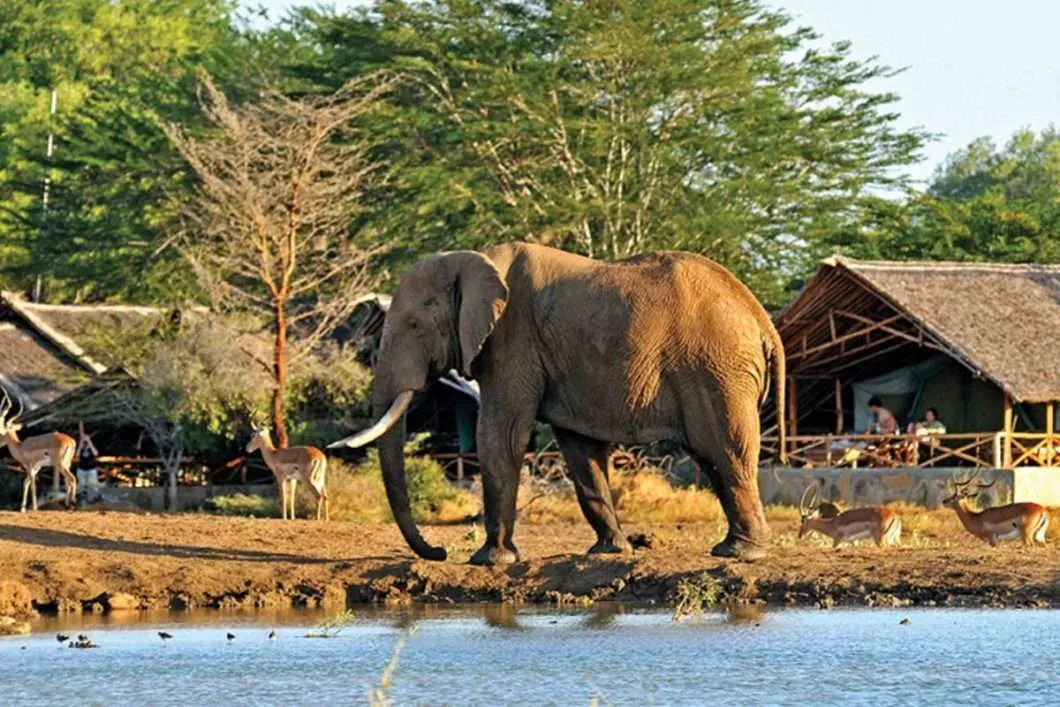
Tsavo East & West
Tsavo West and East National Parks. Tsavo West and Tsavo East are home to peaceful lion prides and loads of other savannah wild game. Split by the Mombasa Highway, their proximity to the coast makes them a great choice for those who want to combine beach and beasts.

Laikipia Plateau
This region has become one of Kenya’s hottest game destinations with some of Kenya’s classiest camps and lodges. The nearby Samburu National Reserve boasts unusual dry-country species of animals and birds.
If you have time, also visit these places
Although the travel reviews go into great detail about the must-see parks in Kenya, there are many other attractions to explore if you have time. Here are a few good ones our travelers typically choose to add on their first Africa safari in Kenya.

Nairobi National Park
The most striking thing about Nairobi National Park, Kenya’s oldest national park (established in 1946), is the very fact that it exists at all. This sliver of unspoiled Africa survives on the edge of a city of more than 3.5 million people. Where else can you get a photo of animals in their natural habitat with a backdrop of skyscrapers?

Meru National Park
This little-visited park (699 square miles) offers some of Kenya’s wildest country but does not feature on the mainstream safari circuit. Meru is where wildlife guardians Joy and George Adamson hand-reared Elsa, the lioness made famous by the 1966 film Born Free.

Lake Naivasha
One of the Rift Valley’s few freshwater lakes, Lake Naivasha is a popular spot for day trips and weekends away from Nairobi. Although the lake is not part of a national park or game reserve, it has pleasant forested surroundings, which are a far cry from the congestion and noise of Nairobi, and there is plentiful wildlife around.

Lake Nakuru
This delightful and compact park covers around 188 square km (73 square miles) and completely surrounds Lake Nakuru on the floor of the Great Rift Valley. Until a few years ago, it was most famous for the hundreds of thousands of flamingos that fed on the algae in the shallows. Nevertheless, Nakuru National Park is still a very rewarding and easy park to visit.

Samburu National Park
“In the far northeast of the Laikipia Plateau, north of Mt. Kenya, is the remote Samburu National Reserve. Lying in the traditional homeland of the Samburu people in hot, arid, and relatively low country on the fringes of Kenya’s vast northern deserts, this reserve is highly regarded by experienced travelers and old Africa hands alike.

Nairobi
East Africa’s economic and logistics hub is Kenya’s capital Nairobi. Because almost every wildlife safari vacation starts and ends in the capital city, it is hard for any traveler to miss Nairobi. Nairobi presents the authentic everyday African urban life, especially the city’s leafy suburbs, where the most exciting attractions are found.
COSTS FOR KENYA SAFARIS (USD)
| Shoestring | Budget | Mid-range | High-end | |
|---|---|---|---|---|
| Camps & Lodges | under $100 | $100 – 250 | $251 – $600 | over $600 |
| Restaurants (per meal) | under $12 | $12 – $20 | $21 – $30 | over $30 |
| Safari Vehicle (per day) | under $100 | $100 – $150 | $151 – $250 | over $250 |
| Local Guide (per day) | under $50 | $50 – $150 | $150 – $250 | over $250 |
Most Kenya lodges refer to an all-inclusive (full-board) per person rate, including taxes, and assuming double occupancy. A few lodges operate on a half-board rate, and rare ones offer bed & breakfast except city hotels.
Experience the ultimate safari adventure during the final days of your trip along the Kenya coast.
Holidays at the Kenya coast
Kenya is home to one of Africa’s most intriguing and historically essential coastlines, perfect for introducing travelers on their first safari in Kenya to Africa’s coastline, away from the safari hooves, canines, and claws. The Kenyan coast stems from extraordinary natural beauty. It is home to marine parks, bustling coral reefs, and bird-filled coastal forests, all of which make for a fabulously diverse holiday after your inland wildlife safari. The southern Kenya coast presents perfect don’t-make-me-think beach holidays with Diani, Galu, and Funzi beaches standing out getaways for honeymooners and romantics. Suitable for diving and great for deep-sea fishing, Mombasa is Kenya’s beach destination for the younger, more social crowd, which means excellent restaurants, nightclubs, and adventures. And Mombasa’s airport means easy combining a Kenya safari with a coastal beach holiday
KENYA TRAVEL ESSENTIALS
Kenya’s Jomo Kenyatta International Airport (NBO) in Nairobi and Moi International Airport (MBA) in Mombasa are the two main international airports, with most domestic flights departing from Wilson Airport (WIL) in Nairobi. Kenya has a well-established network of domestic and regional airlines, with airports in major towns and well-maintained airstrips in safari destinations.
Kenya Safaris transfers are typically provided from the airstrip to accommodations, and schedules for safari airlines often work in circuits. Several airlines offer affordable direct flights to Kenya, including Kenya Airways, Virgin Atlantic, and British Airways. Domestic airlines such as Kenya Airways, Jambojet, and Fly540 provide daily flights to several regional destinations. Charters are also available, although more expensive than scheduled flights. Baggage allowance is usually 15 kg per person on small planes, and self-drive safaris are an option, with several car rental companies offering 4x4s and driver services.
Self-drive safaris in Kenya are available for those who prefer road travel, though poor road conditions in some areas can cause longer driving times. Car rental companies specializing in 4x4s typically offer driver services, with rates starting at around $110 per day for a 4×4 and $20 per day for a driver. Major highways connect Nairobi to other towns and cities. Driving from Nairobi to the Masai Mara, a 150-mile/240-km journey takes about five hours. Long-distance travel by bus is available but not recommended for safari travel.
Kenya is a visa-free country from January 2024. To boost tourism and attract more foreign investments to Kenya, the government removed all visa requirements for all foreign nationals visiting and transiting through Kenya starting January 2024.
The vacated visa requirements have been replaced by the Electronic Travel Authorization (ETA) system. Everyone (except East African Community Nationals) must register at https://www.etakenya.go.ke/ before they come to the country; at least 3 days in advance.
- The ETA fee for all is $30
- You will need a valid passport
- Credit or Debit Card to make payment.
Kenya safaris can be enjoyed year-round, and the best time to visit depends on personal preferences, budget, and travel plans. The period between January and March and June to September is generally considered the peak season, with friendly weather conditions and abundant wildlife activity. However, the rainy season between mid-March to June and October to December is also an excellent time to visit if you want to avoid crowds and take advantage of off-season discounts.
If you are interested in witnessing the great migration in Masai Mara, the best time to visit is between mid-August and late October when the wildebeest and zebra herds cross the border from Serengeti National Park. There is no wildebeest movement from January through to June in Masai Mara, so plan your trip accordingly.
Kenya’s Indian Ocean coast is hot and humid all year round, with the possibility of rainfall at any time. However, it is best to avoid the coast between mid-March and late May when temperatures and rainfall are highest.
Ultimately, the best time to visit Kenya depends on your preferences and travel plans. Consider your priorities and consult with a trusted travel agent or local tour operator for more information and personalized recommendations.
The official currency in Kenya is the Kenyan shilling (KSH), with notes available in denominations of 50, 100, 200, 500, and 1,000 shillings and coins available in denominations of 1, 5, 10, and 20 shillings.
Most things in Kenya are priced and paid for in KSH, but some tourist businesses like hotels, safari companies, and airlines may quote prices in both U.S. dollars and shillings. If paying with dollars, make sure to check that you are getting a fair exchange rate.
When exchanging U.S. dollars at a bank or bureau de change, it’s best to bring new and undamaged notes as old, worn, or damaged bills may not be accepted.
Banks in Kenya typically open at 8:30 am on weekdays and close at 4 pm, with some opening at 9 am and closing at noon on Saturdays. Banks are closed on Sundays and public holidays. Many ATMs in Kenya are available 24 hours a day.
Most banks in Kenya offer foreign exchange services or international electronic transfers. It’s best to avoid banks at their busiest times, especially on Fridays at 9 am and from noon to 2 pm, as well as at the end of the month. Major banks in Kenya include Kenya Commercial Bank (KCB), Barclays, National Bank of Kenya, and Standard Chartered.
Credit cards are widely accepted in Kenya, but it’s easier to withdraw shillings from an ATM for small amounts like restaurants, shopping, taxi fares, fuel, and tips. Most ATMs in Kenya dispense large denomination notes, so try to break them whenever possible, as taxi drivers and souvenir vendors often don’t have change for large bills.
Major credit cards, such as Visa and MasterCard, are accepted at Kenyan banks and ATMs. Most ATMs accept Cirrus, Plus, Maestro, Visa Electron, Visa, and MasterCard. To ensure safety, it’s best to use an indoor ATM, preferably at the airport, in a shopping mall, or guarded by a security officer.
Tipping in Kenya is not mandatory, but it’s customary to give a tip of 10% in restaurants and to porters. Some hotels, safari lodges, and tented camps have a gratuity box for guests to tip all the staff at the end of their stay. It’s recommended to tip your safari driver and guide approximately US$10–US$15 per person, per day. Tipping taxi drivers is not necessary, as the fare is usually determined before setting off.
Kenya offers a wide variety of safari accommodations, ranging from intimate tented camps and luxurious boutique hotels to mid-range safari lodges, beach resorts, local lodgings, and campsites. Lodge prices are usually all-inclusive, covering accommodations, meals, and activities such as game drives and walks. It’s important to find out in advance if park fees (US$40 to US$100 per day) are included. When choosing accommodations in Kenya, consider your budget, travel style, and preferences. Do your research, read reviews, and book in advance to secure your preferred choice.
Nairobi has many hotels, including international chains, charming independent hotels, and older establishments with colonial ambiance. Accommodations on the coast range from luxurious honeymoon hideaways to all-inclusive family beach resorts. On Lamu, some beautifully restored historic Arabic houses have opened as hotels. Standard prices usually include a full English breakfast, and other meals are typically available in the hotel’s restaurant.
Overall, it’s essential to book in advance during high season and look out for specials during the low season or rainy months. When choosing accommodations, keep in mind that hotel rates in Nairobi and other towns tend to remain the same throughout the year, while room prices in wildlife and coastal areas are seasonal. Consider your priorities and preferences and consult with a trusted travel agent or local tour operator for more personalized recommendations.
Although Kenya is generally a safe country, visitors should take basic precautions to avoid becoming victims of crime.
In big towns, mugging, purse snatching, and pickpocketing can occur. Leave valuable jewelry and watches at home, and keep cameras, camcorders, and binoculars out of sight, unless you’re on safari. Lock your valuables in the hotel or lodge safe, or use a money belt under your clothes. Don’t leave belongings on balconies or terraces, and avoid showing them in a vehicle. If you become a victim of robbery, you’ll need a police report to make an insurance claim, so bring copies of all essential documents and keep them separate from the originals. Carry extra passport photos in case you need new documents quickly.
Take a taxi after dark, and don’t accept food or drinks from strangers. Be aware of street scams and appeals for money. If you’re driving, be polite but firm if stopped by police officers charging an instant fine for a minor infraction. If you ask to go to the police station, charges are often dismissed.
Terrorist zones are in Kenya’s northern and northeastern borders, far from the premier tourism attractions. Exercise increased caution in terrorist strongholds but note that these incidents are also far from popular tourist areas. The Kenyan Government has implemented strict security measures at airports and visible policing in shopping malls and outdoor markets, ensuring it is safe to visit Kenya.
Most visitors fly out of Nairobi to attractions such as Samburu, Masai Mara, and Amboseli. High airport security levels have been reported by staff traveling to Kenya regularly, and some hotels in the capital city have instituted additional security measures for peace of mind.
Starting on May 9th, 2023, travelers entering Kenya will no longer need to provide proof of COVID-19 vaccination or a negative COVID-19 PCR test, as per the new regulations from the Government of Kenya.
Travelers with flu-like symptoms will be required to undergo a rapid antigen test at their own cost of 30 USD. Those who test positive on antigen RDT will be required to take a PCR test at their own cost of 50 USD and self-isolate as per Ministry of Health guidance on isolation. Those with severe symptoms shall then be allowed to isolate per the prevailing isolation requirements for mild, moderate, and severe disease.
Any traveler entering Kenya with flu-like symptoms will be required to fill out the passenger locator form on the ‘jitenge’ platform: https://ears.health.go.ke/airline_registration/ and may be asked to undergo a rapid antigen test at their own cost regardless of age or vaccination status.
You can find full details of the Government of Kenya’s entry requirements concerning coronavirus at the Kenya Civil Aviation Authority website.
Before traveling to Kenya, it is important to ensure that all routine vaccinations are up to date. The risk of malaria is low during the Green Season and very low during the peak season, but higher in rural areas and villages outside the parks and reserves. If you plan to go scuba diving after your trip, be sure to inform your doctor to ensure that the correct prophylactic is prescribed. Check with your healthcare provider to determine if additional vaccinations are required.
Yellow fever vaccination is required for travelers aged one year or over arriving from countries with a risk of yellow fever transmission. The vaccine is generally recommended for all travelers aged nine months or over, except for those whose itineraries are limited to certain areas. Malaria is an issue in certain areas and travelers should consult their healthcare provider well in advance about the best malaria prophylactics to take.
It is recommended to use sunscreen and bug repellent with DEET. HIV infection rates are high, so it’s important to exercise caution. Make sure to have full medical travel insurance that includes repatriation in case of a medical emergency, and ensure that it covers any active pursuits you plan to undertake. Medical bills are often paid upfront in Kenya, so keep all paperwork to make an insurance claim.
The AMREF Flying Doctors service provides air evacuation and transportation between healthcare facilities for medical emergencies in Kenya, Tanzania, and Uganda, or anywhere within a 1,000 km (621 miles) radius of Nairobi. The planes fly out of Nairobi’s Wilson Airport 24 hours a day, 365 days a year.
Consult your local health authority for up-to-date health recommendations before your trip to Kenya, and know your blood type. Kenya has good medical facilities, especially private ones.
The following private hospitals are great for emergency attention;
- Nairobi Hospital – +254 703 082 000
- Karen Hospital- +254 206 613 000
- Aga Khan Hospital – +254 203 662 000
- M.P. Shah Hospital – +254 204 291 000
Local landline and mobile calls are inexpensive in Kenya, but hotels add hefty surcharges to phone calls. Public telephones are no longer widely available since most people carry a mobile phone. If you don’t want to use your mobile phone due to expensive international roaming fees, you can buy a Kenyan pay-as-you-go SIM card from one of the service-provider stores or street vendors. The local providers are Airtel, Safaricom, and Telkom. Coverage is good throughout most of the country but can be patchy in remote areas.
When making a call within Kenya, use the full 10-digit number, including the area code, even if you’re in the same area. City codes are (020) for Nairobi, (041) for Mombasa, (040) for Diani Beach, and (012) for Lamu. To call outside Kenya, dial 000 before the international code. For example, dial 000 (0001) for the United States, 00044 for the UK, and 00027 for South Africa.
Internet is widely available in Kenya, with free Wi-Fi in many public places in Nairobi and Mombasa, such as restaurants and coffee shops, and almost all hotels and lodges. However, remote areas may not have connectivity, so don’t expect to be able to connect at out-of-the-way safari lodges or camps. You can top up your Kenyan pay-as-you-go SIM card with data for internet access.
Kenya prides itself on game meat and seafood, organically grown vegetables, and excellent tropical fruits (such as passion fruit, papaya, and mangoes). When you’re near the coast, sample traditional Indian and Arabic food and look for Kenyan-grown tea and coffee and Tusker beer, a local brew.
“Swahili tea” is very similar to chai in India. You’ll find most cuisines, from Chinese to French to Ethiopian, in restaurants in Nairobi.
Accommodation options for your safari
Kenya offers various holiday accommodation options for safari travelers. Luxury lodges provide private rooms, fine dining, and exceptional service, while budget-friendly campsites offer a more rustic experience with basic amenities and a closer connection to nature. When selecting accommodation, consider its location and proximity to national parks and wildlife reserves, as well as the level of luxury and your budget. Some lodges offer all-inclusive packages, while others charge separately for each service. Take a look at our carefully curated list of lodges and camps that are perfect for wildlife safaris in Kenya.
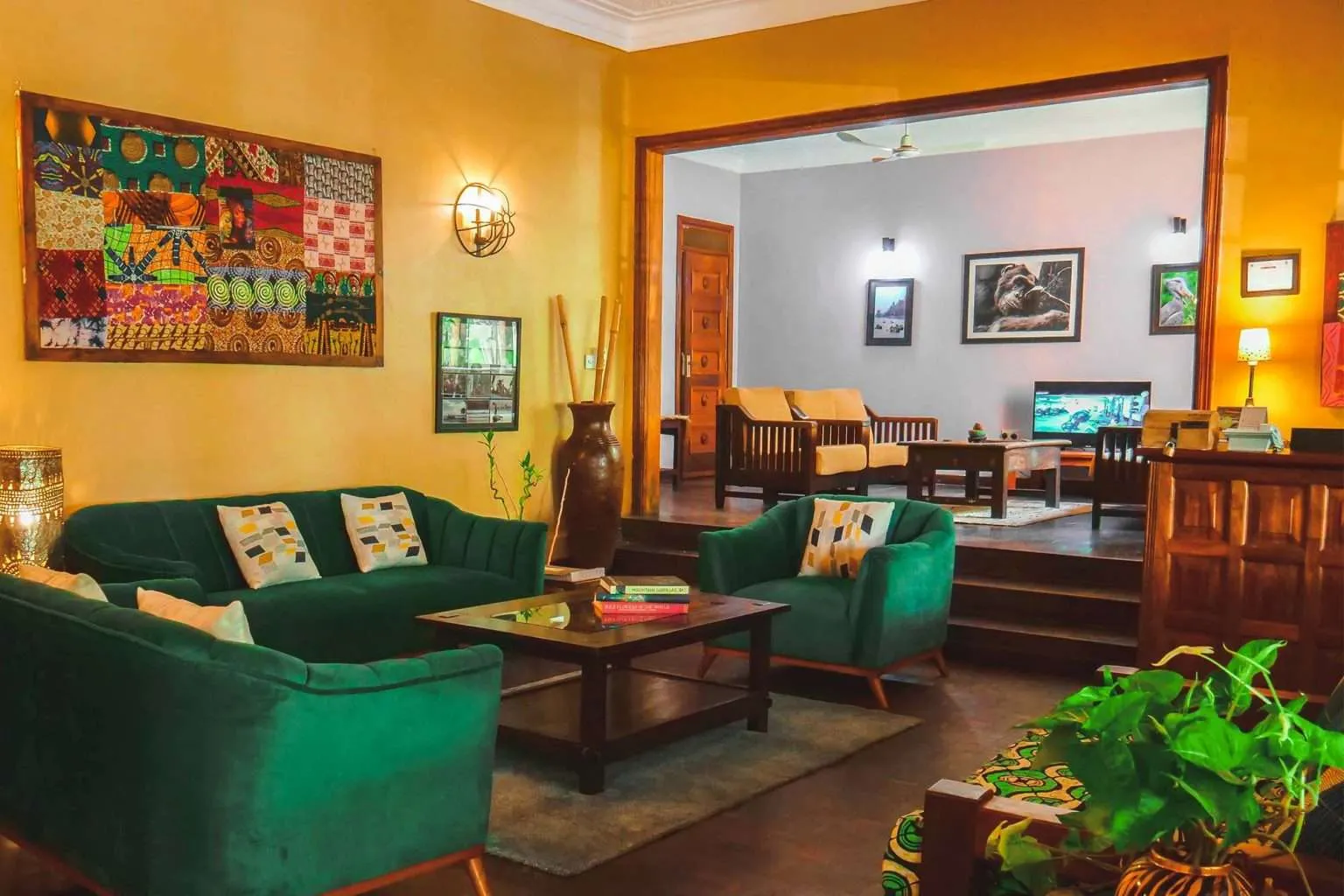
JW Marriott Masai Mara Lodge
From $2,711 pp
Papyrus Guesthouse is an eco and cozy lodge in the suburbs of Entebbe, about 15 minutes from Entebbe International Airport. It is an excellent choice for safari travelers who hope to relax in Entebbe after/before their international flight.

Mara Serena Safari Lodge
From $290 pp
The Luxury Hotel Number 5 is a quaint suburban boutique retreat nestled in the quiet colonial part of Entebbe. It’s about 15 minutes drive from Entebbe International Airport, the primary entry point to Uganda.

Spirit of the Masai Mara
From $1,302 pp
Nkuringo Bwindi Gorilla Lodge is thoughtfully comfortable and concentrates on cheerful African hospitality, which complements its superb location and function as the best base for gorilla trekking safaris in the south of Bwindi Impenetrable National Park.
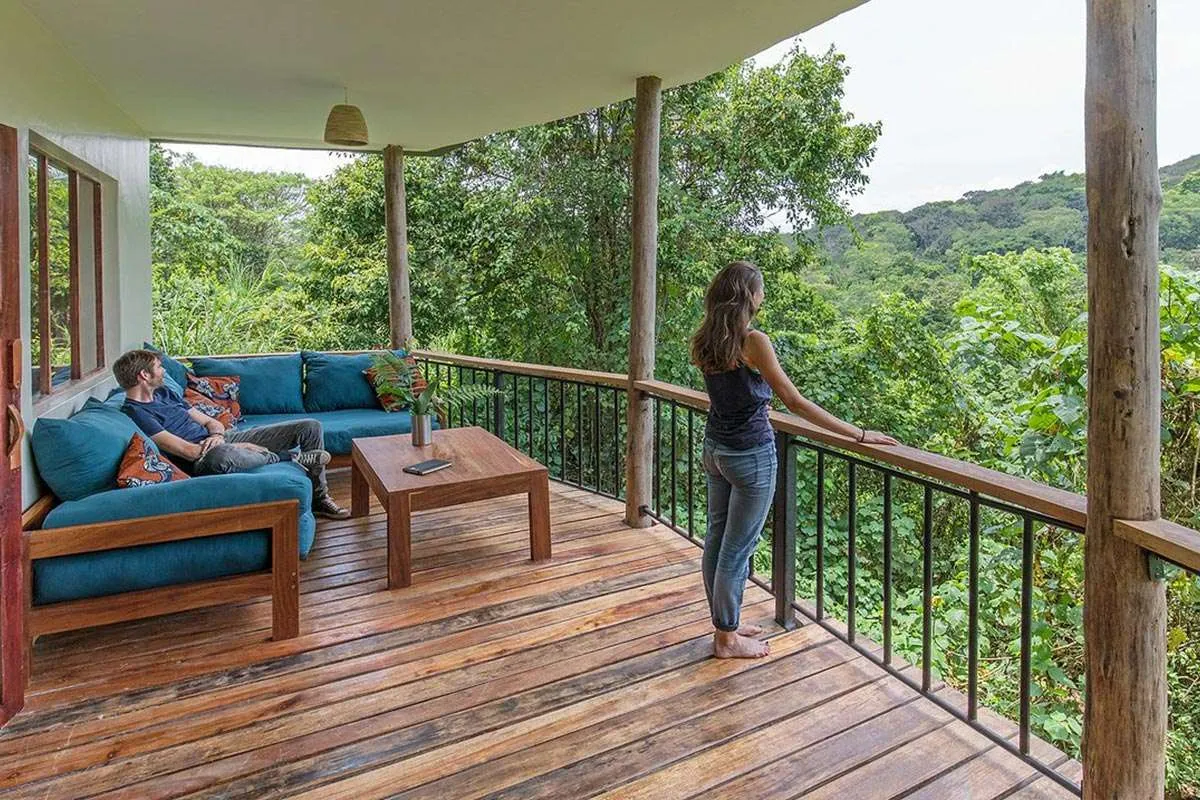
Amboseli Serena Safari Lodge
From $248 pp
Turaco Treetops is a lush semi-luxury lodge on the edge of Kibale National Park. It’s got stunning views of the forest canopy, the massive Rwenzori mountains, and the creator lake decorated landscape of the region.
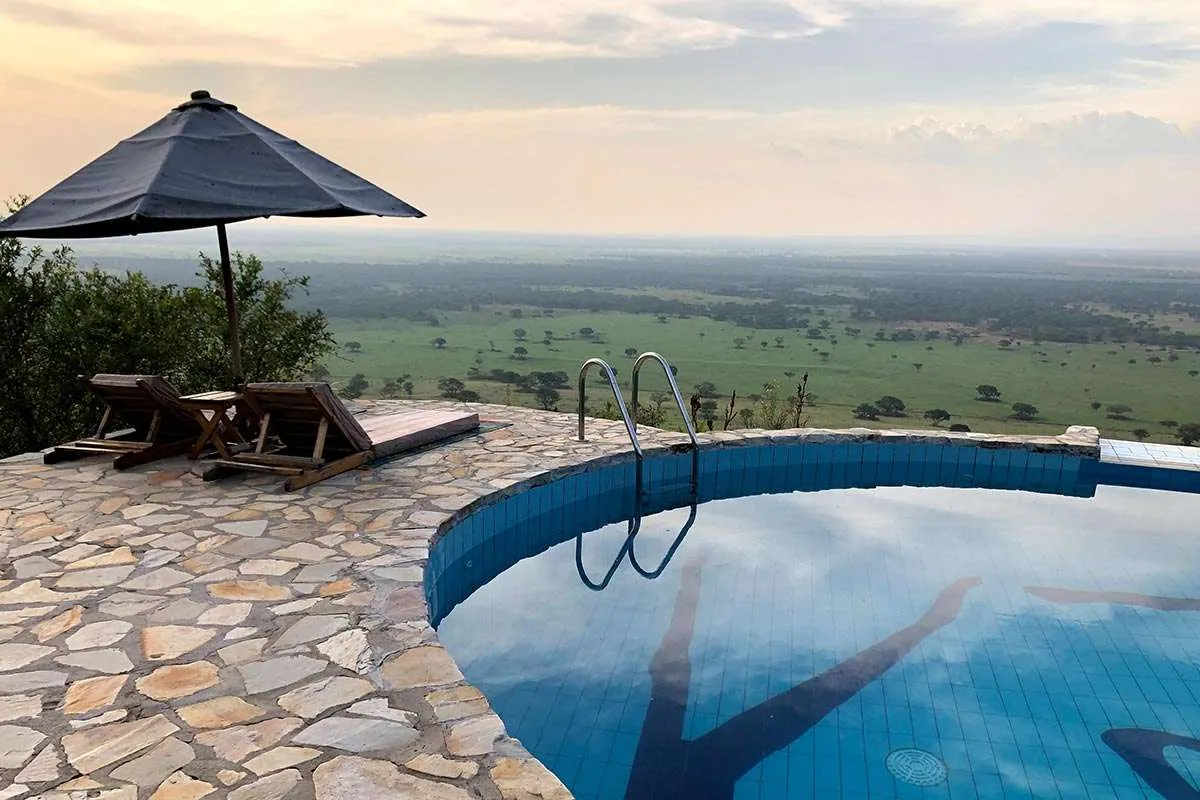
Kilima Safari Camp
From $200 pp
Katara Lodge sits on escarpment farmland overlooking Queen Elizabeth National Park’s northeastern sector in western Uganda, A pleasant intimate, and simple safari lodge with eight cottages overlooking the vast park’s savannah plains.

Katara Lodge
From $200 pp
Katara Lodge sits on escarpment farmland overlooking Queen Elizabeth National Park’s northeastern sector in western Uganda, A pleasant intimate, and simple safari lodge with eight cottages overlooking the vast park’s savannah plains.
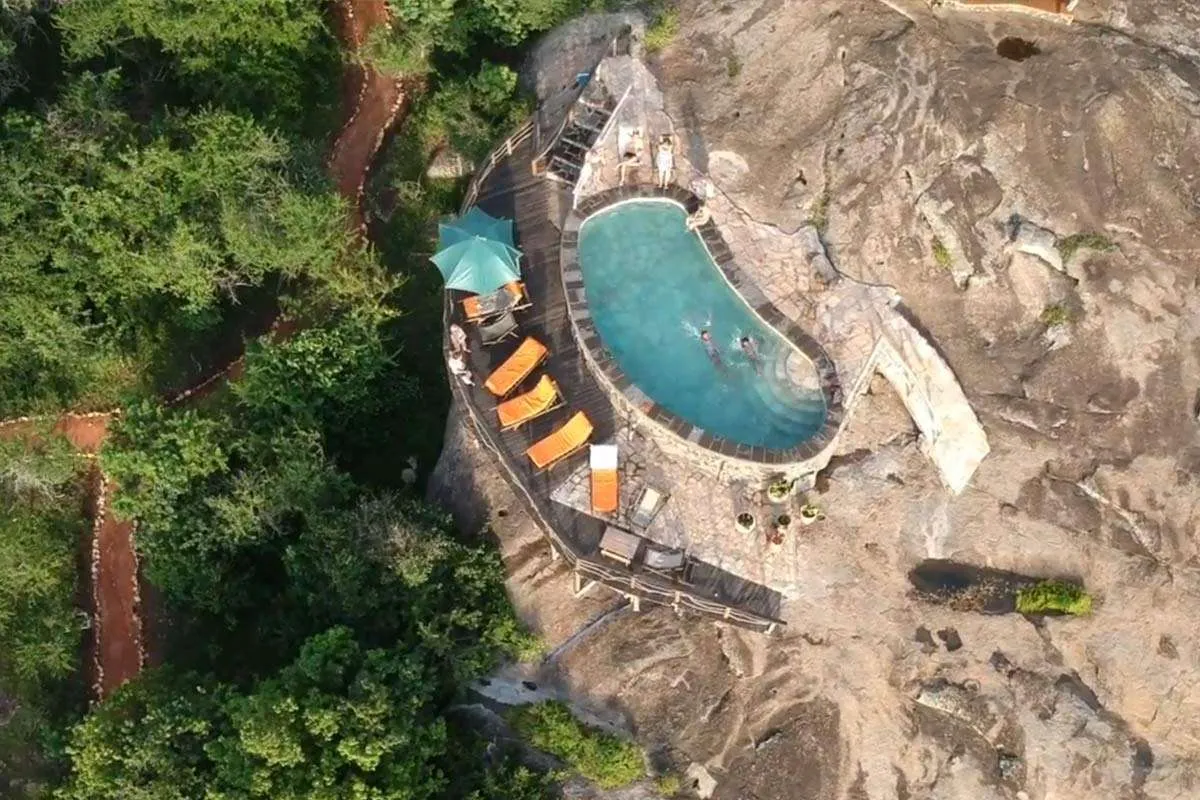
Elewana Tortilis Camp
From $200 pp
Rwakobo Rock Lodge is a wilderness retreat secluded on a rocky outcrop at the edge of Lake Mburo National Park’s northern border. The lodge provides private getaways in the locally-styled cottages dotted around a massive granite outcrop, with stunning views over the wilderness plains.

Ololo Safari Lodge & Farm
From $1000 pp
The pioneer luxury safari getaway is located on a picturesque rocky kopje overlooking the Narus valley in the southwestern sector of the park. The lodge has a relaxed classic safari feel, quietly providing a peaceful and private wildlife experience from the privacy of your veranda.

The Emakoko
From $2000 pp
Nestled in the foothills of the Virunga Volcanoes, The Emakoko is an exclusive vacation lodge with a tranquil charm enthralled by the dramatic backdrop of three of the extinct Virunga volcanoes. Its rustic charm creates an absorbing atmosphere of tranquility and the region’s history.






